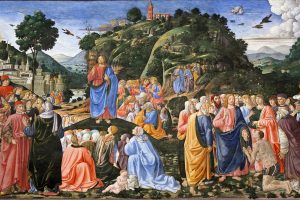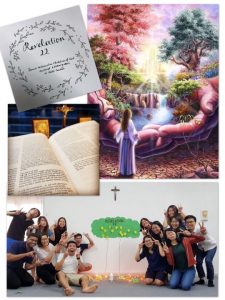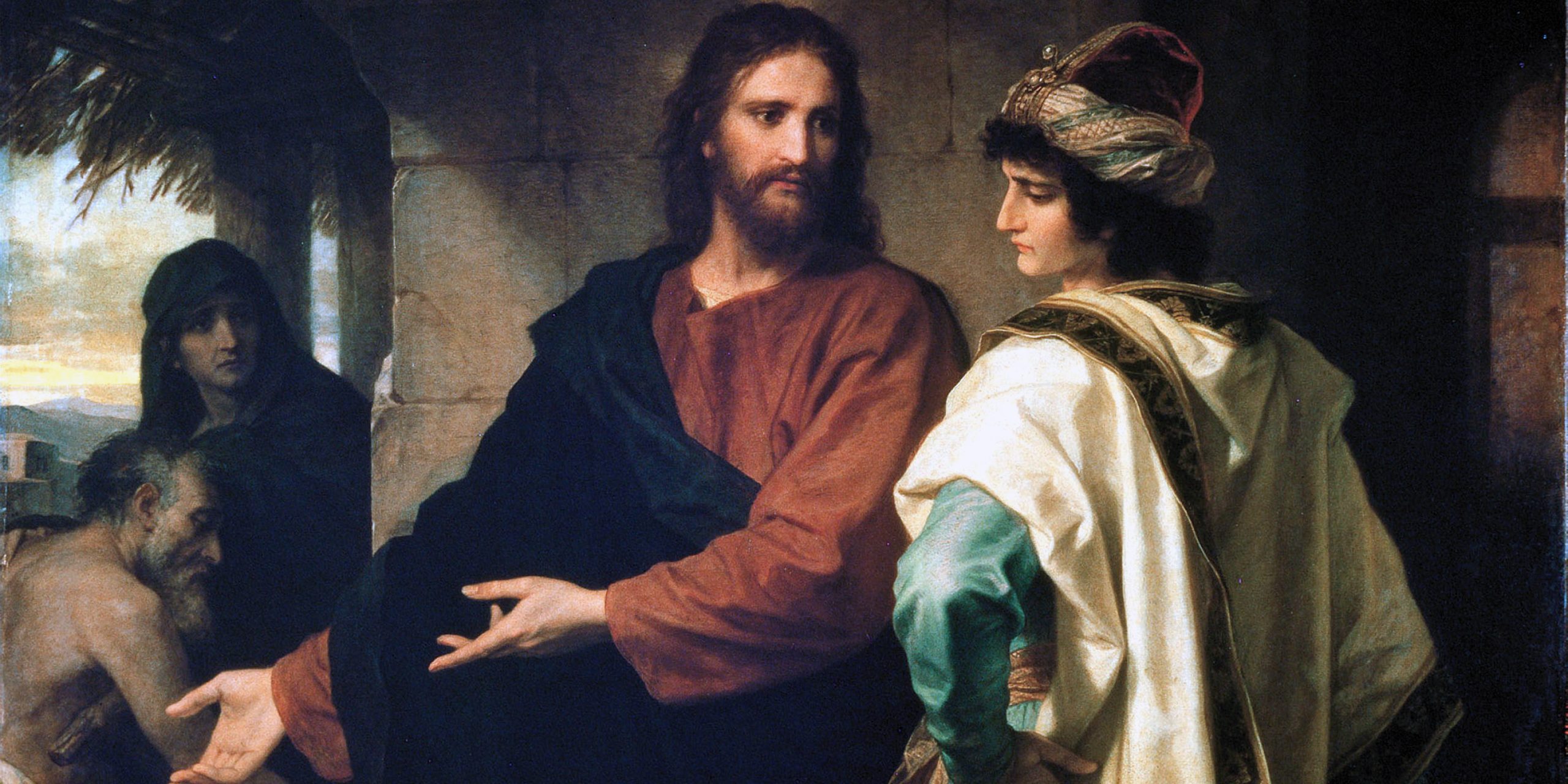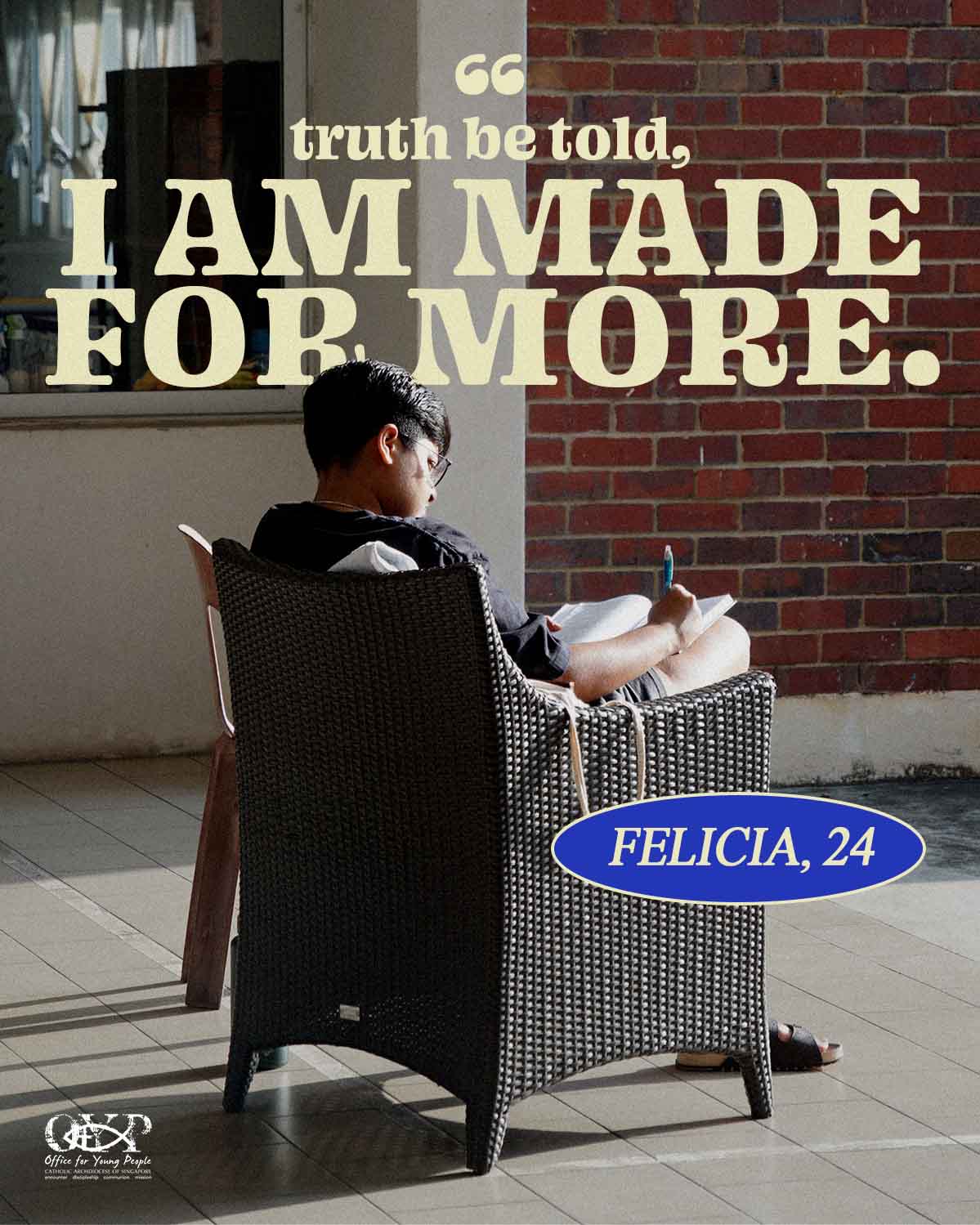In the Rosary, “poverty of spirit” is described as the spiritual fruit from reflecting on the Third Joyful Mystery, the Nativity of our Lord. What is poverty of spirit? We may imagine that it refers to sacrifice or carrying of our crosses, resulting in us feeling down in spirits.
Yet, in the Gospel of Matthew (5:3), Jesus tells us in the first of the Beatitudes: “Blessed are the poor in spirit, for theirs is the kingdom of heaven.” Wow! Without beating around the bush, Jesus tells us right off the bat that spiritual poverty is directly linked to entering the kingdom of heaven and becoming a saint. So, clearly, poverty of spirit is a very important concept in our spiritual lives.

But what exactly does being poor in spirit entail?
Trust in God and Detachment from Worldly Things
The Catechism of the Catholic Church (CCC 2547) states that:
“Abandonment to the providence of the Father in heaven frees us from anxiety about tomorrow. Trust in God is a preparation for the blessedness of the poor. They shall see God.” (emphasis added)
Pope Francis, in his message at World Youth Day 2014, said that the Greek adjective for poor, ptochós, is linked to the Jewish notion of anawim (God’s poor). Beyond material poverty, anawim suggests a sense of one’s limitations and existential poverty – the anawim trust in the Lord and know that they can count on Him.
Furthermore, the CCC (2548) states:
“Desire for true happiness frees man from his immoderate attachment to the goods of this world so that he can find his fulfillment in the vision and beatitude of God. ‘The promise [of seeing God] surpasses all beatitude… Whoever sees God has obtained all of the goods of which he can conceive.’”
St Faustina Kowalska of the Blessed Sacrament, the mystic nun that preached God’s message of Divine Mercy, said that poverty of spirit: “is an evangelical virtue which impels the heart to detach itself from temporal things” (Diary, 93).
From the above, two key aspects to spiritual poverty, which are inextricably linked to each other, can be distilled:
First, spiritual poverty requires us to trust in God – not only in knowing that God’s providence will give us all that we need in our lives, but more importantly, in knowing through our encounter with God that He is the treasure that we are seeking in our lives. He is the fulfillment of our deepest desires.
Second, we are called to have a spirit of detachment to the things of the world, knowing that God is the treasure that we seek in our lives and that we can rely fully on His providence. Having such a spirit of detachment to the things of the world is of course challenging because of our innate selfish and disordered desires to possess material riches and to seek consolation in the abundance of worldly possessions.
But as John the Baptist said succinctly:
“He Must Increase, but I Must Decrease.” (John 3:30)
We can all identify with the desire to possess worldly things, to indulge in the desires of the flesh. We may struggle on the path of chasing one material good after another, one impulsive desire of the flesh after another; all that they would lead us to are brokenness and emptiness. Indeed, we may be fighting such temptations on a daily basis.
Leading a life giving in to such desires is exhausting because it is like a drug that always needs to be fueled by more things of the world. Pope Francis calls this the “haze of ravenous consumption”, which is seen in the attitude of “the more I have, the more I want”. Critically, while the innate desires of our flesh and of the world can tempt, lure, and fill us with momentary pleasure, they can never bring about lasting peace and joy. Creating idols out of the material things around us, or even people around us, will invariably result in failure and brokenness due to their temporal nature. Many of us have experienced this struggle, even though each of us experiences it in different forms.

It is only by turning to God, surrendering our lives to Him, acknowledging that only He – through the sacrifice of our Lord Jesus Christ – can bring about our eternal salvation, and responding to His call to unite ourselves with Him, that we discover the ultimate meaning and purpose of our lives. And this is the path that brings us lasting joy and peace. As the Psalmist says: “Take delight in the Lord, and He will give you the desires of your heart.” (Psalm 37:4)
It is also important to note that God calls us to have a spirit of detachment to material things, and not necessarily to actually rid ourselves of all worldly things in our life. In this manner, material things are not our ultimate goal, and spiritual detachment from them means that we know we can be happy and at peace without them. This in turn allows us to be capable, in the words of Pope Francis, of “tasting the essential, of sharing, capable of renewing each day the wonder for the goodness of things”, and to recognise that the material things in our lives originate from the creative love of God and we should rightfully praise the Lord for giving us such blessings.
Giving and Receiving from the Poor
Apart from growing to trust fully in God and building a spirit of detachment to material things, God also calls us to take concrete action towards those around us who are poor and to use His blessings in our lives generously for the good of others. Through our faith in His providence, we are able to give wholeheartedly what we have to those in need.

First, Pope Francis calls us to a “conversion in the way we see the poor”. We need to be sensitive to those around us, whom God has placed in our lives, who may be facing different forms of poverty. As the world is changing, so is the face of poverty. Beside those suffering from difficulties in financial and material needs, physical disabilities and health issues, war, crime, and various forms of persecution and discrimination, and loss of loved ones, there are also growing trends of emotional and mental health difficulties, separation and divorce, familial and spousal abuses, various forms of addiction such as drug abuse, sexual abuse and pornography, alcoholism, and many others. We must always remember that, as Pope Francis said, each encounter with someone who is suffering is to “encounter Christ himself”, and is a concrete opportunity to “touch His suffering flesh”.
Second, as our Archbishop William Goh has said on many occasions, in giving we are not doing the poor a favour. We should rather take the opportunity to learn from their wisdom, especially in the spirit of detachment to material things and in trusting more fully in God and His providence – in being humble and in learning how to love, how to give, and how to be more like Jesus – for through their suffering, the poor are united with Jesus’ suffering on the cross; they have so much to teach us in learning to imitate Jesus in our lives.
The Call to Imitate Jesus
Often, it is a struggle in the busyness of our lives to find time to help others, to give to others. We may often find ourselves being focused on our own self-centered interests and tasks, and justifying that we don’t have the time to do more. In living out our lives as laypeople in the world, it is very easy to get lost in the pursuit of making more money, building our careers, chasing after material goals, and all the other distractions of daily living.
In such times, more than ever, placing our gaze on Jesus is crucial, for:
“In all of His life, Jesus presents Himself as our model. He is ‘the perfect man’, who invites us to become His disciples and follow Him. In humbling Himself, He has given us an example to imitate, through His prayer He draws us to pray, and by His poverty He calls us to accept freely the privation and persecutions that may come our way.” (CCC 520)
St Paul’s words in his letter to the Philippians (2:5-7) sums up the path for us to follow: “Let the same mind be in you that was in Christ Jesus, who, though He was in the form of God, did not regard equality with God as something to be exploited, but emptied himself, taking the form of a slave, being born in human likeness.” In this vein, let us focus with greater intentionality on growing in spiritual poverty, so that we may grow ever closer towards imitating Christ in our lives, and towards ultimately fulfilling the first beatitude: “Blessed are the poor in spirit, for theirs is the kingdom of heaven.”

Featured image: Heinrich Hofmann, Christ and the Rich Young Ruler
Be edified in your faith. Like us on Facebook and follow us on Instagram.






